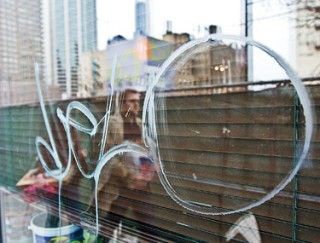Criminal creative expression on the rise
April 12, 2009
 A short walk down South Wabash Avenue on Columbia’s campus is enough to see a growing trend of vandalism. Dozens of graffiti tags and stickers litter the sides of buildings, signs, mailboxes and sidewalks, creating enough of a problem for the college to take action.
A short walk down South Wabash Avenue on Columbia’s campus is enough to see a growing trend of vandalism. Dozens of graffiti tags and stickers litter the sides of buildings, signs, mailboxes and sidewalks, creating enough of a problem for the college to take action.
Although most of the graffiti tags on campus aren’t typical spray painted messages, it is no less of a problem. Stickers, oil pastel tags and stencils are commonly seen on campus, as is one particular form of vandalism called acid etching, which causes structural damage.
Acid etching uses corrosive acid to melt and eat into glass and it is impossible to scrub away, said Randy Smith, owner of R.A.D. Window Technology.
The materials used for acid etching can be bought at any art supply store, but the main ingredient used in the etching material, hydrofluoric acid, can be harmful to the skin, causing potentially serious burns, according to the Center for Disease Control and Prevention.
To combat acid etching, Columbia has contracted R.A.D. Window Technology, a business specializing in window treatments, to cover windows with a protective film. The company finished coating the windows of the 618 Building, 618 S. Michigan Ave., on April 4.
Smith said the etching chemicals don’t react with the film. The chemicals will leave a mark, but can be cleaned with soap and water.
“People carry the acid etch around in a plastic bottle,” Smith said. “As long as it’s in plastic, it’s inured. It will only activate when you touch it to glass.”
If a window is damaged by the chemical, the only way the vandalism can be effectively removed is by replacing the entire window.
“The cost of replacing the film is a lot less than the cost of having to buy a new window,” Smith said. “Some of it can be buffed out, but the buffing process is expensive also.”
With the rise of acid etching on windows, Smith’s business is growing. He said three years ago the security film was 10 percent of his business, but in the past year it has risen to become 60 to 70 percent of his work.
In a response to the rise in vandalism throughout Chicago, Mayor Richard M. Daley created an initiative in 1993 to combat graffiti. “Mayor Daley’s Graffiti Blasters,” part of the Department of Streets and Sanitation, is a free service that paints over graffiti or sprays it off with a high pressure baking soda and water mixture, according to city spokesperson Matt Smith. But, there is nothing the Graffiti Blasters can do to combat acid etching on windows.
Smith said the service, which has removed more than million pieces of graffiti since its creation, has previously worked to remove vandalism on Columbia’s campus.
Much of the graffiti around the city is gang-related, but Columbia’s problem is not related to violence or organized crime. Smith said many students who vandalize see the practice as a form of artistic expression. Even so, it is still illegal.
“If you’re a good artist, you can work with your medium to express yourself, but some people like going onto people’s property and vandalizing it and trying to do it in the so-called ‘name of art.’ That’s an affront to art,” Smith said. “A good artist really learns how to make people appreciate their art and doesn’t do it at the expense of other people.”
Damage resulting from artistic graffiti and acid etching is more than an inconvenience to the college, it is a crime.
“The penalty for graffiti is much more serious than people realize,” said Bob Koverman, assistant vice president of Safety and Security. “The Chicago Police Department takes it very seriously. The judges are not particularly tolerant because of the magnitude of the problem.”
If the cost to repair the damage, including materials and labor, resulting from window etching exceeds the Chicago Police Department’s standard of misdemeanor damage, the person responsible for the graffiti can be charged with a felony.
“There is a concerted effort to apprehend people who are involved in etching,” Koverman said. “I don’t want to see our students go to jail.”







